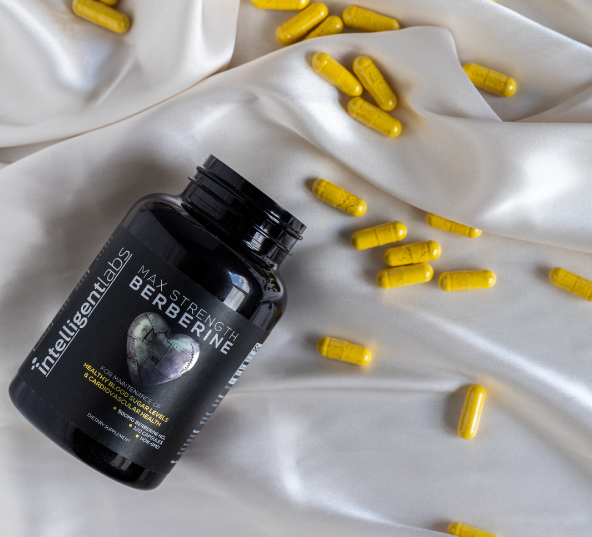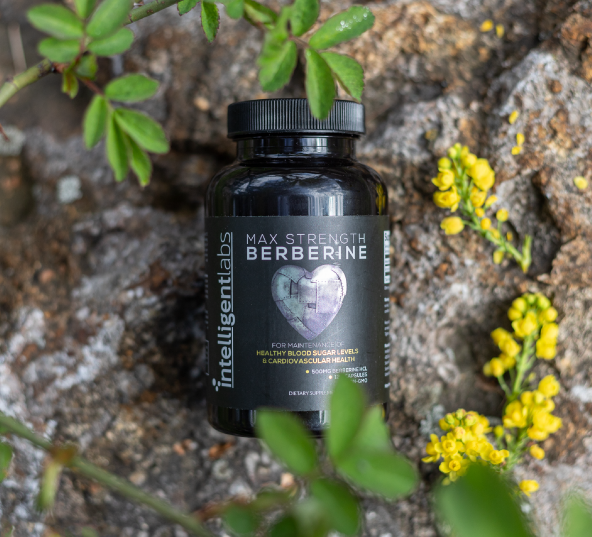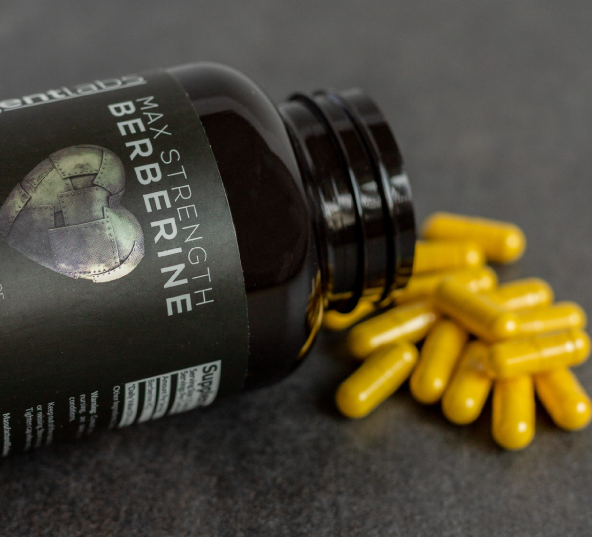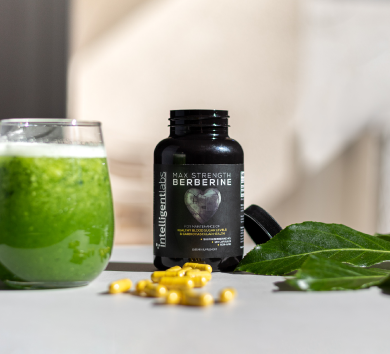Nutrition
Ultimate Guide To Berberine: The Best Natural Metformin Alternative
The incidence of insulin resistance, obesity, and other metabolic disorders has reached massive proportions in many nations. Currently, one of the more popular drugs available by prescription is metformin. While effective, it does have potential side effects, some of which are serious (1). In this article, we’ll do a deep dive into Berberine, a phytonutrient that’s fast becoming known as the best natural metformin alternative!
Table of Contents
What is Berberine and where does it come from?
Berberine is a plant-based alkaloid compound that is gaining popularity as a natural metformin alternative. It’s found in plants such as goldenseal, barberry, coptis, Oregon grape, and tree turmeric. (2)
The benefits of berberine are wide-ranging. Its medicinal effects are known in ancient Ayurvedic and Chinese communities. It’s used to treat inflammation, infections, parasites, wounds, ulcers, indigestion, hemorrhoids, and diarrhea. Of course, widespread diabetes is a relatively new health concern. So, past healers didn’t pay much attention to diabetes during ancient times. (3)
How exactly is Berberine a natural alternative to metformin?
Here are 11 ways that Berberine can help you, making it one of the best natural alternatives to metformin!
1) Berberine lowers blood sugar and improves insulin sensitivity
Berberine lowers blood glucose as much as common drugs used for that purpose. Here are a few mechanisms that explain its effect on blood sugar:

* Berberine supports insulin production in the pancreas
A 2012 study reported that Berberine may help decrease glucose and insulin levels in both human and animal blood. It also appeared to help promote insulin sensitivity in the body. (4)
Apparently, these benefits are due to the regulation and repair of pancreatic islet cells. These are specialized cells in the pancreas that make several hormones, including insulin. Insulin allows your cells to absorb glucose from the blood and use it for energy.
* Activates the “Metabolic Master Switch” enzyme
Berberine can activate the AMPK enzyme, also known as the “metabolic master switch”. AMPK plays a vital role in our body’s step-wise pattern of energy metabolism. Defects of AMPK’s signaling pathway can result in obesity and other metabolic problems. By activating AMPK, Berberine can contribute to the metabolism of glucose and fats. (5)
* Stimulates enzymes that break down glucose
A 2014 study found that AMPK activation wasn’t the only mechanism by which Berberine can lower blood sugar levels. Even when AMPK was blocked, Berberine still lowered blood sugar levels. The authors concluded that Berberine also promotes glucose metabolism through glycolysis, the breakdown of glucose by enzymes. (6)
By lowering blood sugar and improving insulin sensitivity, Berberine truly is nature’s very own metformin alternative.
* Reduces breakdown of certain carbs and starches
Berberine is also able to work against diabetes (we cover this topic in more detail below). Basically, it works in the same way as drugs that prevent carb digestion, hence reducing the impact of carbs on blood sugar levels. Examples of these drugs are miglitol and acarbose. Specifically, these drugs inhibit the enzymes that break down sugars and starches, i.e. glucose. (7)(8)
The natural forms of these drugs do exist in plants such as Curcumin and Berberine. (9) So if you’re looking for a metformin alternative, consider natural sources. But do talk to your doctor to see if Berberine is the right metformin alternative for you.
* Prevents the liver from creating too much glucose
The liver is the main site in the body for making and storing glucose. This function is key during times of starvation (between meals) and fasting. Berberine also inhibits gluconeogenesis, which is the production of glucose that takes place in the liver. (10)
2) Berberine supports healthy metabolism
The same mechanisms that allow Berberine to control blood sugar and insulin sensitivity also allow it to support the metabolism of carbs and fats. Here’s a quick recap:
Berberine inhibits glucose production in the liver and glucose digestion in the belly. It also activates the AMPK enzyme that regulates fat and sugar metabolism. Moreover, it also helps repair and support islet cells in the pancreas, which produce insulin.
3) May promote weight loss
In one study, obese human subjects took 500mg of Berberine 3x a day for 12 weeks. They reportedly lost an average of 5 pounds (2.3 kg). Moreover, they also lost more cholesterol and triglyceride than they would have through other traditional weight loss methods. (11)

Another study, this time with metabolic syndrome patients, reported significant weight loss in just 3 months. BMI dropped from an average of 31.5 (obese) to 27.4 (overweight). Dosage was only at 300mg 3x a day. Researchers concluded that improving insulin resistance most likely played a role in the amount of weight loss seen in this group. (12)
A third study that gave a 2x daily dose of 500mg Berberine to 154 patients for 6 months also reported the same thing. Conversely, the group not given Berberine actually gained weight. (13)
Related article: Will Taking Berberine For Weight Loss Work?
4) May help reduce inflammation
In 2014, researchers examined Berberine’s anti-inflammatory effects on subjects with metabolic disorders. In their analysis, they noted a large number of antioxidant and anti-inflammatory activities in both human and animal subjects. (14)
5) Berberine helps eliminate bacteria, viruses, and fungi
In addition to its effect on glucose and insulin, Berberine also helps kill bacteria, viruses, fungi, and parasites. There are actually too many to mention here. However, here are some key notable ones to consider.
- Berberine may be able to fight candida overgrowth. Candida is a fungal infection that begins in the gut and can spread throughout the body. (15)
- A rodent study reported Berberine reduced the mortality of the flu virus from 90% to 55%. (16)
- Berberine may also have an effect on certain antibiotics, making them highly effective against the deadly MRSA bacteria. (17)
6) It may promote faster wound healing
Berberine has also shown that it may help wounds heal more quickly. This is most likely due to its antibacterial and anti-inflammatory effects.
7) It promotes heart health and lowers cholesterol
High blood sugar, high triglycerides, and unhealthy cholesterol levels can increase the risk of heart disease. Berberine may help reduce all three risk factors.
Moreover, it can also elevate the level of healthy cholesterol in the body. (18) It’s even been shown to improve the survival rate of people who previously had heart failure. (19)
8) Berberine lowers fat build-up in the liver
A scientific review looked at Berberine’s ability to reduce fat storage in the liver. While the exact mechanism is still unknown, it remains a very promising treatment option for conditions like non-alcoholic fatty liver disease. (20)
9) May improve mood
Rats given Berberine for 15 days showed increased levels of serotonin (19%), dopamine (52%), and norepinephrine (29%) in their brains. (21) Meanwhile, another study noted a number of ways Berberine may improve mood, especially in patients with mood disorders. (22)
10) It encourages good gut bacteria balance
Excessive amounts of “bad” bacteria in the gut is linked with metabolic disorders, like type 2 diabetes (23).
Researchers blame unhealthy diets consisting mainly of processed foods and a lack of fiber. Healthy gut bacteria need fiber to reproduce and create short-chain fatty acids (SCFA’s) which reduce inflammation. Unfortunately, diabetics have lower levels of these beneficial bacteria that create SCFA’s. (24)

Here’s where Berberine comes in:
According to a 2011 study, Berberine not used by the body may suppress “bad” gut bacteria. Some of these “bad” bacteria help create the conditions for diabetes. Interestingly, Berberine that is absorbed may help suppress these strains, too. (25)
Another positive news from the same study is that Berberine doesn’t seem to suppress the “good” bacteria, especially in the lactobacillus and bifidobacterium groups. These groups are usually found in probiotic supplements, yogurt, and other probiotic-rich foods.
11) It may help with acne
Adolescents who took 600mg of oral barberry extract for 4 weeks reportedly showed significant improvements in acne symptoms. (26)
Related article: 14 Amazing Research-Backed Berberine Benefits!
Can Berberine help with type 2 diabetes?
Metformin is often prescribed to diabetics to help keep their blood sugar under control. So, the question now is, is Berberine a suitable metformin alternative for diabetics? Well, here’s what a couple of scientific studies say:
Study #1
A 2008 study on 36 adults recently diagnosed with type 2 diabetes noted similar results on Berberine and metformin. Both effectively lowered blood sugar levels. However, Berberine worked better than metformin in regard to fat metabolism. (27)
In part B of the study, data from 48 adults with poorly controlled type 2 diabetes was analyzed. Berberine helped improve blood sugar and cholesterol levels as well as fat metabolism. Side effects were only minor and temporary, such as passing gas, gas pains, diarrhea, and constipation. Fortunately, there no damage was observed in the function of the liver or kidneys. (27)
The study concluded that Berberine, “may serve as a new drug candidate in the treatment of type 2 diabetes.” They noted its low cost and relatively good safety profile compared to established drugs with similar effects. (27)
Study #2
In 2015, a meta-analysis compared the effects of Berberine on those with type 2 diabetes. They looked at 27 randomized controlled clinical trials with a total of 2,569 patients participating. Some compared Berberine to placebos with and without exercise programs and other “lifestyle interventions.” Others compared Berberine to oral drugs that lower blood sugar levels. (28)

The researchers concluded the following:
- Taking Berberine with lifestyle intervention was more effective at lowering blood glucose levels.
- It showed positive effects on blood sugar when combined with similar drugs.
- Berberine’s ability to lower blood sugar is as effective as other medicines.
- They also recommended Berberine for those who can’t afford pharmaceutical drugs.
To sum up this section, Berberine acts as a natural alternative to metformin and similar drugs. In fact, even women with PCOS (polycystic ovarian syndrome) may also benefit from taking it! There’s no cure for PCOS yet. But both metformin and Berberine may help manage PCOS symptoms.
Berberine vs Metformin: Side Effects
What are the side effects of Metformin?
Common Side Effects
“Commonly reported side effects of metformin include: lactic acidosis, diarrhea, nausea, vomiting, and flatulence. Other side effects include: asthenia, and decreased vitamin B12 serum concentration.” (1)
The same website recommends telling your doctor if you experience the above problems after taking metformin. Other common side effects to watch for include muscle cramps, painful urination, stomach pain or discomfort, fever, chills, sleepiness, and appetite loss.
Less Common Side Effects
“Less common effects of metformin include cold sweats, anxiety, dizziness, blurry vision, fast or irregular heartbeat, headache, confusion, slurred speech, difficulty breathing, weakness, and a few others.
Recall that metformin can cause lactic acidosis. Extreme cases of lactic acidosis can cause dangerously low blood pressure, hypothermia, and death. Some extreme cases began with minor symptoms like “malaise, myalgia, respiratory distress, somnolence, and abdominal distress.” (1)
Metformin may be a bad idea if you have advanced liver cirrhosis as it can increase the risk of lactic acidosis. Both metformin and Berberine may be beneficial if you have other liver conditions, but you need to consult your doctor about this. (29)(30)
A 13-year study of the effects of long-term metformin use revealed vitamin B12 deficiency and anemia as common side effects. Those low in B12 had a higher likelihood of developing peripheral neuropathy. The dose was 850mg twice a day. Patients were also enrolled in a diabetes program. (31)
In a 2015 study, medical scientists did a study on stroke patients with impaired glucose intolerance. For side effects, they noted:
“That 19 patients were randomly assigned metformin. 9 patients in this group had side effects, mostly gastrointestinal. This led to the permanent discontinuation of 4 patients after 3–10 weeks.” (32)
Does Berberine have any side effects?
Berberine lowers blood glucose levels significantly with relatively few side effects. Thus earning its nickname as a natural metformin alternative.
You may recall from the 2008 study mentioned above that some Berberine patients taking 500mg three times a day experienced a few side effects. These include passing gas (19%), abdominal pains (3.4%), diarrhea (10.3%), and constipation (6.9%). However, these effects were only temporary. (27)
Also, if you’re taking metformin or other similar substances, combining them with Berberine may cause your blood sugar levels to go too low. Therefore, make sure to consult your doctor if you think you might be in this category.
On the other hand, Berberine can work together with other substances that lower blood sugar, at least at specific dosages. However, don’t turn yourself into a human drug lab without proper medical supervision.
You also want to be cautious when taking it with herbs and drugs that can thin blood. Or if you have a history of low blood pressure.
If you want to use Berberine to treat a disease like diabetes, then please talk to your doctor first. Do this regardless of whether you currently use drugs, herbs, or extracts of any kind.
If you’re pregnant or breastfeeding, do consult with your doctor as well. There is a possible link between Berberine and health risks in newborn babies. (2)
Berberine dosage: How much should I take?
Berberine is metabolized in the liver and is well absorbed by the body very quickly. After a few hours, routine blood tests will only detect very small amounts in the blood. This means you have to take Berberine after every meal to have a constant supply in your body.
This is why studies involving people with diabetes often take a dosage of 500mg three times a day. But don’t take more than 500mg at any one time as doing so may cause the side effects listed above.
Make sure to choose a pure Berberine product as well. Our product contains no wheat, eggs, yeast, soy, sugar, salt, maltodextrin, animal derivatives, magnesium stearate, artificial flavors, or preservatives.
How long does Berberine take to work?
You might notice consistently lower blood sugar levels after about one week of use. But this effect may not become apparent for three or four weeks.
The length of time required for Berberine to show health benefits may vary according to the benefit you are seeking and the conditions within your body.
Where to buy Berberine?
You can purchase our Max Strength Berberine supplement here. Each capsule contains the clinically recognized 500mg dosage. Our third-party lab testing consistently ensures the purity of the product and the accuracy of the labeling.
Final thoughts
Berberine is a natural substance that has many health benefits, including helping with blood sugar and insulin sensitivity. Safety profile is also good with minor and temporary side effects. To conclude, Berberine is just as good as metformin and multiple scientific studies do concur with this statement.
This article is for educational purposes only. It’s not a substitute for sound medical advice from your doctor. We don’t promise that Berberine can treat or cure any of your diseases. But we do offer credible information so that you can make informed decisions about your current health.






